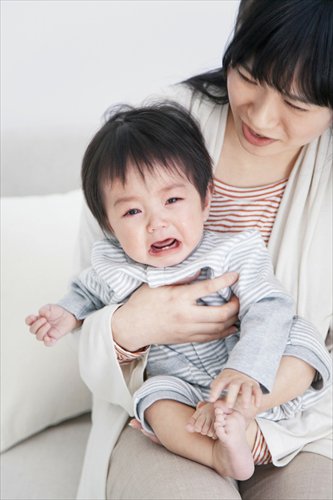Parenting gap
Foreigners think some Chinese methods are strange and unnecessary

Many foreigners fear Chinese parents' way of raising children will spoil them. Photo: IC
How should you raise a child? Parents from different countries have different views. In China, a newborn often means tons of work for all family members. There are numerous cases of a newborn exhausting a whole family of four grandparents and two parents.
Meanwhile, many foreign mothers take care of several children simultaneously, with no extra help.
Recently, authorities announced all Chinese couples will be permitted to have a second child for the first time since 1980. According to a recent Global Times report, this across-the-board relaxation of the family planning policy will trigger an expected boom of more than 20 million newborns in 2017.
Metropolitan interviewed three foreigners living in China, who have closely witnessed and experienced Chinese parenting techniques. They observed that some Chinese methods are troublesome and unnecessary, but are impressed by the love and cohesion among Chinese family members.
Meet the interviewees
Paula Raman: a 30-year-old Australian woman who has been living in Shanghai for two years. She is married to a Chinese man whose hometown is in Shandong Province, and has to endure the many differences she and her husband's large family have in raising her child.
Ivy Makelin: a Chinese-American mother of two sons based in Beijing. Her parents raised her in Western way and her husband is American. She found a lot of Chinese families having problems in disciplining their children.
Tim Nevin: a 29-year-old US man who has lived in Beijing for about one year. His Chinese friend just became a father, and Nevin has made a lot of observations about the new family.

A big family of three generations is often centered on the grandchildren in China. Photo: IC
More trouble preferred
Since Nevin's best Chinese friend David Zhang became a father, Nevin seldom gets the chance to hang out with him anymore. In Nevin's words, "The poor guy and his family have devoted all the time they have to the newborn."
Nevin and Zhang's other foreign friends visited their family after the baby boy was born. They were astonished to see how these Chinese parents and grandparents doted on the baby.
"There were hundreds of people taking care of the baby, and they seemed to prefer the most troublesome ways," said Nevin. He saw dozens of homemade diapers hanging on the balcony, and the baby's two grandmothers were hand washing dozens more. The smell in the room was rank, but they were happy to be doing the washing.
"I was astonished the first time when Zhang told me Chinese babies wear cloth diapers, and was shocked by the old women's enthusiasm for washing diapers filled with feces and urine," said Nevin.
Nevin said in his hometown, children wear disposable diapers until they are potty trained.
For Makelin, Chinese potty-training methods are rather strange, not only because children are wearing cloth diapers, but also because children always wear split pants, which is "convenient" for toilet training.
Group effort
Raman's life was simple and happy until she fell pregnant.
"My husband's family began to take care of their grandson while he was still in my belly," said Raman. "They do love me and my son, but I can never understand the way they raise a baby."
When Raman was five months pregnant, her husband's family, including his parents, aunts and uncles, and even his grandmother, who is over 90, visited them from Jinan, Shandong Province, and they took turns looking after her.
Once Raman found her husband and his mother quarreling as she was returning from the gym. Later her husband told her that his mother said a pregnant woman should never go to the gym. His mother blamed him for letting her go, but she would not say this directly to Raman. After all, irking a pregnant woman can be bad for the baby, too, said Raman.
After Raman gave birth to her son, she took care of him for the first three months, and everything went smoothly until she had to go abroad for an emergency business trip. Her in-laws stepped in to take care of the baby.
"On the first day when I got back, I saw my son being forced to make a bowel movement," said Raman. "I was stunned."
The baby was being held by his grandmother and forced to sit on a potty, naked from the waist down, and crying. He refused to sit on the potty, but his cries were ignored. "Instead, my husband's aunt was teasing him with his favorite toy, saying if he made a poo-poo, he could play with the toy, or it would be thrown away," said Raman. "My father-in-law meanwhile, was holding the toilet paper and wet tissue, singing and whistling at him."
Later she learned that this was a method used to get a baby to make a bowel movement at regular intervals, to prevent him from wasting a clean diaper unexpectedly and requiring extra labor to wash it.
Since Raman has decided to raise her son to be independent and capable of caring for himself, she is concerned about her husband's family spoiling him.
"My husband has an older sister who has a 4-year-old daughter. The girl has been spoiled by her grandparents," said Raman. "I can not see any respect in her attitude and behavior toward her parents and grandparents. She is not even able to dress herself."
Raman said she would not allow her son to be spoiled by her husband's family. "I talked with my husband and he agreed to adopt my method to raise our son. When I was a child, my parents let me learn to do everything on my own, and I think my son can make it, too."
Discipline issues
According to Makelin's observations, Chinese kids have a lot of power at home, and everyone listens to the child instead of the child listening to and respecting the adults.
"I see a lot of Chinese children controlling their parents, maybe even grandparents, and I find it quite scary," said Makelin. It appears that many Chinese parents don't discipline their young children. There is no formal discipline other than yelling, which in Makelin's view, is not an effective method.
"I think there are too many people in Chinese families raising kids, and it is too confusing for the kids because everyone has different boundaries. It's easier for kids to be raised by just two parents," said Makelin.
However, Makelin said the discipline issues developed in Chinese homes can be reversed by Chinese schools. Her older son is in an international school, and her younger son is in a Chinese school. "Although my children are not spoiled, they have some behavior issues such as deliberate disobedience. It took a shorter time for the younger one to get rid of the bad habits than the older one, so I think Chinese parents can trust the teachers on guiding their children."
Caring Chinese parents
The Chinese way of raising children is not all bad to foreigners.
"As for early education, China is doing really good," said Raman. "It was quite weird to start receiving phone calls from early education institutions right after our son was born."
According to Raman, her Chinese friends all send their children to early education sessions.
"I was confident that I can teach my son all the things he needs to know before he goes to kindergarten. But after several sessions I found that I underestimated the devotion of Chinese parents to their children."
The centers have lots of high tech equipment and offer various activities to teach children how to speak both Chinese and English. The centers also give children an early understanding of traditional Chinese culture, she added.
Nevin said he found that family ties in China are very strong, and a newborn is often the bond connecting a huge family of dozens of people.
"I was deeply moved by the grandparents' devotion to the baby, because I only saw my grandparents no more than 10 times since I was born. They do not care about me," he said.
Nevin said that his friend Zhang, the new father, told him that he and his wife love the new two-child policy by the Chinese government, and they want a second child.
"Although the grandparents will be older then, I don't think the love and care they offer to their grandchildren wil dwindle," said Nevin.